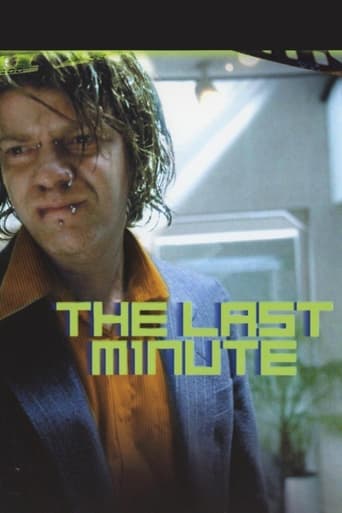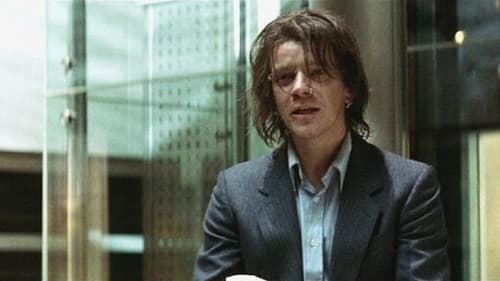Nick Dets
Stephen Norrington's "Blade" is undoubtedly a highlight of recent American cinema. It was one of the grandest blockbusters of the 90's - a powerhouse of trend-setting style and beautifully realized action sequences. Norrington proved to be an ambitious and promising director. It's unfortunate that he stumbled with his follow-up. "The Last Minute" is scatterbrained, indecisive and consequently confusing and also too derivative of other hip directors (Danny Boyle, Guy Ritchie)."The Last Minute" is semi-autobiographical of Norrington's experience with the entertainment industry. While it's confusing as to just what kind of "artist" the protagonist Billy Byrne is, it is clear that his exploits mirror that of Norrington's. Byrne is hailed as an up and coming genius, then almost immediately thrown out to dry by his employers, the media and all of his so-called friends. What's more, Bryne's old flatmate steals his career, leaving him with nothing. In this dilemma, Norrington asks some very good existential questions about the true worth of an artist. There are plenty of brilliant artists living in every city of the world who never have and probably never will be recognized. Having mass appeal is key, as is circumstance, opportunities and luck. The artists who do make it are sometimes self-important, because they wrongly believe themselves to be completely entitled to the recognition they obtain. This shows that the true value of art is not determined by things like mass-appeal and critical praise. A better film would have stayed with these questions.Norrington's account of a bought, sold and rejected artist is too complex, because its personal nature interferes with the larger themes and messages. First, Norrington shows a throw away entertainment industry that is fickle and disloyal, meaning many artists are bound to get stepped on. It is a nice set-up for a satire, but then the film takes a misstep by having Byrne realize that he had little life experience in the first place. The movie is then suddenly about Byrne's quest for personal experience and redemption, losing the satirical edge the film starts off wanting. "The Last Minute" is too personal for its own good.The story then takes another step in the wrong direction by suddenly morphing into an Oliver Twist-inspired story about the underbelly of London. The biggest problem with this second act is that it was simply not credible. There wasn't a good enough motivation for the fame-hungry Byrne to actually live in complete destitution. It would have been more consistent for him to just observe poverty in order to obtain "experience." Another problem with the second act is the misconception that poverty is "reality". Its too easy, and also far-fetched, for Byrne to learn experience by being poor. Things get especially muddled when an action sequence (followed by a musical sequence) erupts, reminding the viewer just how lost the screenplay is. The Christopher Guest movie "The Big Picture" was a similarly satirical look at a young Hollywood director. It share's "The Last Minutes" sense of magical realism, but is more effective in its clarity. Both movies use humor and absurdity to poke fun at and criticize the entertainment business, but "Big Picture" works so much better because it is consistent and concise. "The Last Minute" rambles and loses touch with its tone and purpose. That's not to say Norrington's film is uninspired or dull. He is still high off his love of flash and glamor, exhibited in "Blade". He again uses stylish techniques like time lapse, jump-cut editing and extreme mood lighting to show the frantic atmosphere of big cities that leads to large-scale marginalization of many citizens. His cinematographer James Welland picks up where Blade's Theo van de Sande leaves off, beautifully using murky colors and quick dolly-in shots to create a constantly on-edge feeling. Norrington is brilliant in how effectively he brings all elements of production into a seamless whole.Norrington's direction does falter in his overuse of Euro-trendy devices. There are bombastic musical sequences and over the top characters which feel way too similar to trends started by Danny Boyle, Guy Ritchie and Baz Lurhman. Norrington proved in "Blade" to be highly original and trend-setting himself, and has no need to borrow the quirks of other filmmakers. Let's not forget that this is one of the first guys to use pre-"Matrix" bullet-time.It's a shame Norrington has claimed to have given up on motion pictures. After "Blade," he blew every chance he had to make another classic. "The Last Minute" shows a director who is unfocused, but passionate. Did mavericks like David Lynch not make the same mistakes early in their careers as well?
sonicsociety
It's late, it's extremely humid, every breath is like a drink of city soaked in smog water. I pop the DVD into my player and was transported to a late feast of clever visual effects, smart script lines, and a wicked soundtrack. So wicked that I immediately started to hunt the internet for it.I was impressed by the very fine acting of Max Beesley, very convincing character transformations throughout the film. Not since discovering Christian Bale did I feel like wanting to see more films from someone.Even though this movie centered around London's Underground, I felt like this could've been any city...reminding me of it's inhabitants running about half-asleep, forgetting (ignorance is bliss) about existence and valuing life.The movie made me feel guilty for feeling guilty about wanting to indulge and live a little in life.I recommend this movie anyone who likes movies that give you that feeling of "there's a message here for me".
Craig_Boehman
This is probably one of my favorite English import movies in the new millennium. Gritty, dark, poetic, and funny-- with a cast of very talented actors by and large unknown to the American audience (one possible exception may be Jason Isaacs, who played Percy). While there are elements in this movie that do remind me of other Brit classics such as: Snatch, Loch Stock, and perhaps, 24 Hours in London, it does stand on its own as a feature worthy of viewing.Billy Byrne, played by Max Beesely, is a starving artist who has a lot of hype behind his latest art project, the nature of which I'll omit here. When critics and the public turn on him, Billy falls on hard times. Dumped by his girlfriend, he is left to his own devices when he meets a homeless girl who introduces him to some seedy, urban denizens. Drawn into a life of drug abuse and general mayhem, Billy takes another crack at the big time with his next great idea. But his the pitch men will have none of it. Forced back into the streets, Billy and his young companion struggle to survive their addictions. When the opportunity comes to escape their dismal lives, it is Billy who answers the call and abandons his friend. We end the movie with an implied flight to Greenland which neatly ties in with the opening scene of the movie.A very smart, existential film with wonderfully-colored characters.
mrbiscuit
The atypical gritty Guy Ritchie British school of modern film class has reared a muddled mess of a movie. With a grandiose, meaning of life premise, the somewhat shallow and undefined plot leaves little room for depth of any real substance. Between the drawn-out stylistic vignettes and the over-abundance of effects, the film falls flat on it's fashionable face. A lower rating would have been in order had it not been for some humorous and entertaining moments, where levity and brevity are welcome friends and make the almost unbearable bearable. Overall, it's a mildly entertaining bit of mindless madness with a side order of "seize the day." Not worth a trip to the theater, but might do in a pinch at your local video store.




